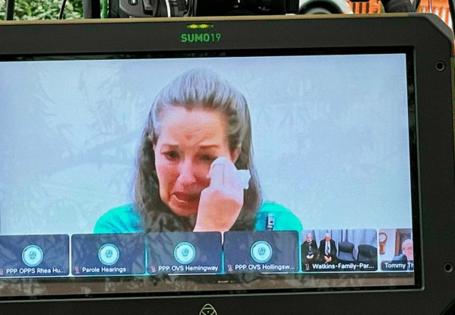Susan Smith denied parole 30 years after killing her 2 sons. Here's what her husband said
Published in News & Features
COLUMBIA, S.C. — Susan Smith, the South Carolina woman whose lies about killing her two sons sharply divided a small town, was denied parole Wednesday morning.
Smith’s denial was decided unanimously by five members of the parole board of the state Department of Probation, Parole and Pardon Services. Smith appeared via video conference before the board, which is an independent body appointed by the governor. One member, Geraldine Miro, served as interim warden of a prison that Smith had been housed in and recused herself.
In denying her parole, board members cited the “nature and seriousness of her crime” and an unfavorable “institution record.”
Few believed that Smith, 53, would be granted parole just 30 years into her two life sentences for the murders of her sons Michael, 3, and Alex, 14 months. In the lead-up to her hearing, the probation department said that they received 471 letters and emails about Smith’s parole. Just 6 were in support of her release.
In a plea for mercy, a sobbing Smith said, “I want to say how very sorry I am. I know that what I did was horrible and I would give anything if I could go back and change it.”
On Oct. 25, 1994, Smith, just 23, released the handbrake of her Mazda Protege and let the car roll backwards into the cold water of John D. Long Lake in Union County, South Carolina. Michael and Alex were inside.
“This story is really a mental health story,” said Smith’s attorney, Tommy Thomas, who said that Smith’s actions the night of the murders were driven by untreated mental health issues, including post-partum depression. Smith had never recovered from her father’s suicide at age 6 and had attempted suicide multiple times, Thomas said. But stigma around mental health care had prevented her from getting the treatment that she needed.
Once, Thomas said, when Smith was hospitalized for mental health reasons, her mother told people she had strep. The night of the murders, Smith lost touch with reality and was not fully aware of the consequences of her actions, Thomas said.
But Smith’s mental health did not move the Smith family, Michael and Alex’s relatives, who opposed her release.
“God gave us free choice. She made free choice that night to end their life,” said David Smith, her ex-husband and the father of Michael and Alex.
“She changed my life for the rest of my life that night ... she came pretty close to causing me to end my life because of the grief that she brought upon me, but thank goodness that she didn’t.”
Today, South Carolina’s sentencing laws require that a life sentence be served in its entirety without the possibility of parole. But at the time Smith was sentenced in 1995, a life sentence carried a penalty of 30 years to life.
Had she been paroled, “Ultimately that’s only 15 years per child, her own children,” said David Smith. “It’s just not enough.”
Throughout the hearing, much attention was paid not only to Smith’s crimes, but also her lies 30 years ago to family and in media appearances, which drew national attention to Union County.
After killing her sons, Smith claimed that she had been carjacked by a Black man in a toboggan-style hat, or beanie, at a red light. The man supposedly shoved a gun in her face and demanded her car, claiming he wouldn’t hurt her or her boys. He then sped off with the boys in the car. Over the following days, as police and volunteers searched constantly for her children and as racial tensions rose, Smith pleaded on television for the safe return on her sons.
“This was a global sensation,” said Kevin Brackett, the 16th Circuit solicitor who helped prosecute the case as an assistant solicitor. “This didn’t just traumatize him (David Smith), it traumatized Union, it traumatized South Carolina. The entire county was in the grip of her lie.”
“How many Black men in red Mazdas got pulled over around the country?” Brackett asked.
But suspicious law enforcement officers coaxed the truth out of Smith, who nine days after reporting her sons missing admitted that she killed them. Divers found the car in John D. Long Lake. Brackett said he remembered the silence of the scene as a tow truck pulled the red car out the lake, and the prayer they still had that maybe it was a different car.
“I didn’t lie to get away from it, I was just really, really scared,” Smith told the parole board. “I didn’t know how to tell everyone who loved them them that they’d never see them again. I didn’t know how to tell David he could never see his sons again.”
But few say they can now believe Smith.
“She lied and manipulated everybody, the whole world. I believed it myself, I wanted her to be telling the truth. Whatever she told you today I’m sure were lies as well,” said Tiffany Smith, David Smith’s wife.
The search and Smith’s trial became a media sensation as lurid details were exposed. Tommy Pope, now a Republican state representative and House Speaker pro tempore from York County, argued that Smith had killed her children in order to start a relationship, and a new life, with a wealthy man in town who didn’t want children.
While Thomas argued that this was never proven in court, Pope repeated this argument at the hearing. In Smith’s car was a wedding dress and a wedding album, Pope said. “It was a nice little package that she could just roll away... if David was in the car she would have rolled him away too.”
It was revealed that when Susan Smith was 15, she was molested by her stepfather, Beverly Russell, a leader in the local Republican Party, member of the Christian Coalition and a nephew of a governor.
No charges were pressed, but Smith’s parents separated. Russell ultimately mortgaged his house to pay for Smith’s lawyer and, according to court testimony, her relationship with Russell continued for many years even after she married David Smith.
At trial, Pope argued unsuccessfully for the death penalty.
“I felt strongly that if the Black man in a toboggan (hat) had committed the crime, people would have expected the death penalty. If David Smith had committed the crime, people would have expected the death penalty,” Pope said.
“The jury showed her mercy. One juror after the fact said they believed that the life sentence was the greater sentence.”
During her time in prison, Smith has committed multiple infractions, including possession of drugs, using another inmate’s PIN and, most recently, speaking with a documentary company.
But Thomas sought to show a different side of Smith, pointing to her work as a math tutor, her love of art and her work with the Jumpstart prison fellowship. If released, Smith would have lived with her brother and was continuing to work towards a degree in Christian Counseling.
“I really think Susan is ready for parole now,” said Anne Currie, who, along with her husband, retired Presbyterian pastor Tom Currie, were Smith’s only supporters. “She surrounds herself with a supporting and caring community. She’s grieving and will always grieve and she’s learned from it.”
But of the seven people who spoke against Smith’s release, not one believed that prison could redeem Smith enough to earn her release.
“She betrayed her children against the laws of nature. She should’ve been protecting them,” said Brackett. “I don’t think she should ever be allowed out until the last person alive who remembers Michael and Alex dies, and that will not be in her lifetime.”
Lingering impact
Wednesday’s hearing, heavily attended by media from all around the country, only emphasized how much the Susan Smith case continues to impact and define all who were involved.
“Union will always be the place where Susan Smith killed her sons,” said Pope. “I will always be the Susan Smith prosecutor.”
For many, the wounds run deeper and pain is still found in unexpected places.
Rebecka Smith French, Susan Smith’s former sister-in-law, said that she looked up to Susan like an older sister and now struggles to form friendships with women. Recently, she tried to learn to scuba dive and recounted to the parole board how she began to panic underwater, ripping off her mask and convinced that she was going to drown.
“I knew in that moment that was the closest I’d ever come to experiencing what they (Michael and Alex) went through,” Smith French said.
Tiffany Smith said that she had seen how her husband struggled to get out of bed some days, and reflected on how the experience had led them to be overprotective of their daughter, Savannah, who had two older brothers taken from her.
“It has changed the way we look at life, it has changed the way we trust people,” said Tiffany Smith. “To help give this family some peace it would be best if Susan stayed behind bars, stayed in prison for the rest of her life.”
While most inmates go before the parole board once a year, because she is serving a sentence for a violent crime, Smith will not be eligible to go before the parole board again for another two years.
“I miss them very much. I love them very much,” said David Smith. “I will be here every two years going forwards to ensure that their death will not be in vain.”
_____
©2024 The State. Visit thestate.com. Distributed by Tribune Content Agency, LLC.










Comments